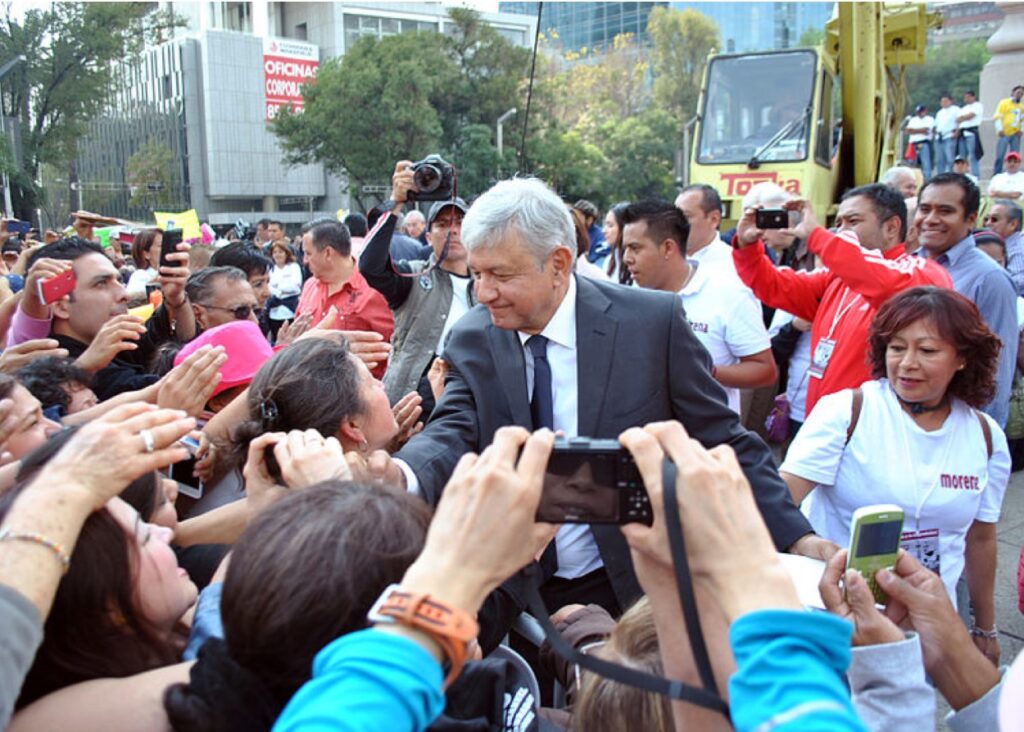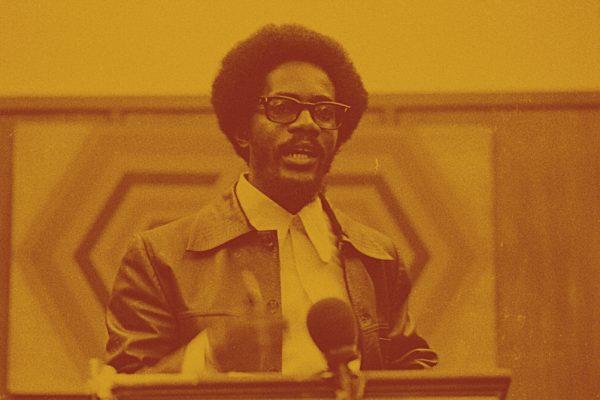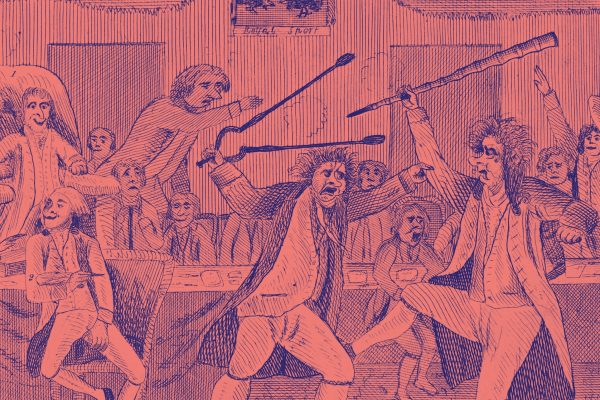On July 1, Mexico will likely elect Andrés Manual López Obrador as its new president. A veteran of the Mexican left, López Obrador has campaigned on a promise of progressive change, and voters are enthralled.
The election looks to be a landslide: López Obrador and his party, MORENA (Movimiento Regeneración Nacional, or the National Regeneration Movement), currently hold a 15–20 percent lead over the second-place candidate.
International observers, faced with the prospect of a López Obrador presidency, are in a panic. Recent coverage claims that he receives support from Putin, maintains a messiah complex, and plans to undermine democratic institutions. MORENA’s policy program, they say, would purge international investors and damage the peso. He is a political risk and a toxic populist, the coverage contends, and his election will mark the death of Mexican democracy.
Far from killing Mexican democracy, López Obrador might be the best shot at reviving it.
But Mexican democracy is already in critical condition. More than 100 politicians have been murdered in the run up to the election. Of Mexico’s 32 state governments, 11 are facing prosecution or are under investigation for corruption. Disappearances, extrajudicial killings, and torture by Mexico’s security forces are widespread and well-documented.
Support for MORENA flows, in large part, from citizens’ sense of democratic failure: 90 percent of Mexicans believe that their government is deeply corrupt, and 93 percent are unsatisfied with how it governs. “We live in a fake republic,” López Obrador likes to say on the campaign trail.
Far from killing Mexican democracy, then, López Obrador might be the best shot at reviving it.
• • •
To understand the appeal of MORENA, López Obrador’s untested populist alternative, it is helpful to review the long and bloody history of their competitors.
The Institutional Revolutionary Party (PRI), is Mexico’s oldest surviving party and home to the current president, Enrique Peña Nieto. Founded in 1929 following Mexico’s revolutionary war, the PRI maintained an authoritarian grip on Mexico for decades. They established formal elections, but the party’s vast network of unions, community leaders, and local political representatives all but guaranteed the PRI’s victory. They made bribes, twisted arms, and won almost all of their local, state, and national elections by a landslide.
Mexico’s current president has a 12 percent approval rating, the lowest in the country’s history—even lower than Donald Trump’s approval rating in Mexico.
The PRI’s electoral dominance, however, did not indicate the depth of its voter support. Throughout the second half of the twentieth century, the party suffered a longstanding crisis of legitimacy—not only because it treated democracy as a mere pretense. At times the party responded to democratic protest with astonishing violence, and disaster with shocking ineptitude.
In 1968, for example, the PRI oversaw the massacre of hundreds of peaceful student activists at Tlatelolco in the lead up to the Mexico City Olympics. Two decades later, in the great earthquake of 1985, the PRI failed to provide emergency assistance to millions of Mexico City residents that lacked access to water, electricity, and basic medical support.
If these failures weakened the PRI’s public credibility, incumbent president Peña Nieto nailed its coffin closed. Corruption has plagued his administration—from property deals for his wife to extensive embezzlement by a top advisor. When public outrage reached its boiling point last year, Peña Nieto launched a National Anti-Corruption System—only to spy on activists promoting its cause and then dismantle it six months later. In December, Peña Nieto’s approval rating fell to 12 percent, the lowest in the country’s history, and even lower than Donald Trump’s local approval rating.
To the left of the PRI is the PRD, the party of “democratic revolution.” The PRD emerged from the wreckage of the 1985 earthquake, when a left-wing politician named Cuauhtémoc Cárdenas Solórzano split away from the PRI to give voice to Mexico’s rising social movements. Cárdenas brought many with him, including López Obrador, who became head of the party in 1996. The PRD became the incarnation of the Mexican left, its great hope for social reform, and the strongest challenger to the incumbent PRI.
Over the last decade, however, the PRD has fallen swiftly from grace. In the 2006 presidential elections—when López Obrador ran and lost by a tiny margin—the party demanded a recount, setting up encampments along Mexico City’s main plaza and inviting millions of their supporters to join them. But when the recount maintained the result, support for the PRD’s insurgency waned quickly. And the party’s claim to procedural integrity began to ring hollow when, just two years later, its internal elections were marred by extensive fraud. Even Cárdenas called for the party to “start over.”
Then came Ayotzinapa. In September 2016—under directions from José Luis Abarca Velázquez, the PRD mayor in Iguala in Guerrero state—forty-three students were abducted by the police and handed over to the Guerreros Unidos cartel. Their bodies were never found. Fallout from the Ayotzinapa mass kidnappings forced the state governor, another PRD figurehead, to step down. But it also revealed the rotten core of the PRD, which had, in short order, adopted all the dirty tricks of its predecessor.
To the right of the PRI is the PAN, the conservative party of “national action.” In the 2000 presidential election, the PAN’s Vicente Fox was hailed as a straight-shooting reformer who could clear away Mexico’s cobwebs of corruption and kick-start its economy. Fox became the first opposition candidate to beat the PRI to the presidency, winning over 43 percent of the vote.
The unholy left-right alliance of the PRD and the PAN—parties which purport to disagree on virtually all issues—signals the death of their principles.
The election marked a “democratic breakthrough” in Mexico, and Fox was just getting started. In his very first month in office, he declared a “National Crusade Against Drug Traffic and Organized Crime” and vowed to “clean the government of corruption.”
The PAN delivered on neither. Under Fox’s direction—and that of his successor, Felipe Calderón—violence rose to historic levels. Mexico saw over 120,000 homicides during Calderon’s term alone, nearly all of which remain unsolved. Meanwhile, the drug trade both broadened its reach across Mexico and tightened its grip on politics. By 2011 the cartels were raking in $39 billion each year (over 20 percent of Mexico’s annual GDP), money which they use to bribe their way to effective legal immunity.
When the PAN left the presidency, Mexico was not only a far bloodier country, it was also a poorer one. Between 2006 and 2012, the percentage of Mexicans living in poverty had grown from 43 to 46 percent.
Today, the PAN and the PRD are campaigning together in a new coalition, “For Mexico in Front.” The unholy left-right alliance of the PRD and the PAN—parties which purport to disagree on virtually all issues, including the privatization of natural resources and marriage rights for gay couples—signals the death of their principles. It is a coalition of convenience, a power play at the presidency. The coalition leader, thirty-eight-year-old Ricardo Anaya, is currently polling in second place, with a healthy 20 percent.
López Obrador has not escaped the charge of playing politics. In December, MORENA entered into coalition with the Social Encounter Party, or PES, a small party from Mexico’s religious right. Just six months earlier, López Obrador denied the possibility of an alliance with the anti-gay and anti-abortion PES, promising that MORENA “will win in 2018 anchored in our own principles, without falling into political promiscuity.” MORENA supporters have been left wondering whether López Obrador’s policies as president will be moderated by PES, or whether his leftist sensibility will shine through once he shifts out of campaign mode.
There are, in other words, legitimate concerns about a López Obrador presidency. But alarmist accounts of “Mexico’s Trumpian populist” largely fail to take into account the sheer bankruptcy of the country’s political establishment. López Obrador aside, Mexican voters are being asked to choose between the piss-poor politics of the PRI and the cynical coalition of the PAN-PRD. All three parties have failed Mexico miserably; it is little wonder MORENA’s message of change is resonating so widely
• • •
MORENA may be untested, but its candidate is not. López Obrador came of age in the old PRI, joining the party in 1976 to campaign for poet Carlos Pellicer in his home state of Tabasco. When Pellicer died just a year later, López Obrador left his post to work with the indigenous Chontal Maya, becoming head of the state’s Indigenous People’s Institute.
López Obrador’s exposure to the indigenous struggle for state recognition led him to clash with the PRI’s central leadership. López Obrador felt that the PRI had betrayed the spirit of the anti-colonial revolution that had led to its founding. “We had tried to democratize the PRI with a progressive governor and it could not be done,” wrote López Obrador. “From that moment on, I reached the conclusion that the PRI was beyond hope.” He broke rank and joined forces with Cárdenas’s nascent PRD.
López Obrador is brimming with exciting policy ideas, but very little Leninist language. Hugo Chávez, he is not.
At the PRD, López Obrador demonstrated not only his commitment to progressive principles, but also his capacity to deliver on them. He began in his home state of Tabasco, where he quickly became party president. To challenge the PRI’s corporatist machine, he organized door-to-door campaigns known as Sun Brigades, introducing neighbors to the PRD and the party’s pledge to clean up corruption in the state.
Four years later, in 1992, he mobilized this growing grassroots support to lead a 600-mile march from Tabasco to Mexico City in protest of the PRI’s widespread vote rigging. His reputation firmly established, he rose to the position of party president in 1996, and four years later, he was elected mayor of Mexico City.
In Mexico City, López Obrador oversaw the revitalization of municipal infrastructure, public services, and the city’s international image. He partnered with billionaire Carlos Slim Helú to plan an ambitious redevelopment scheme for the city center. He deregulated the construction sector to stimulate private investment in infrastructure and housing. And he introduced new benefit schemes for the city’s vulnerable populations.
These programs were anything but radical—in fact, they stirred significant resistance among the Mexican left. But they were certainly popular. López Obrador left office with an approval rating of 84 percent.
Now, in his bid for the 2018 presidency, López Obrador has presented a similarly balanced progressive approach in his platform, “National Project 2018–2024.” Some of his campaign promises are mild iterations of democratic socialist policy: he calls for a review of the PRI’s 2013 decision to privatize the country’s oil industry; vows to introduce a higher minimum wage to bring more Mexicans out of poverty; and plans to introduce a universal pension scheme to protect citizens into old age.
In short, the National Project is brimming with exciting policy ideas, but very little Leninist language. There will be no campaign of expropriation, and there will be no dictatorship of the proletariat. Hugo Chávez, he is not.
The atmosphere of panic around López Obrador’s agenda may doom it before it starts.
Despite this, U.S. media coverage of López Obrador’s run has consistently portrayed him as a radical, a dangerous populist who will stop at nothing to bring revolution to Mexico. He is “authoritarian, intolerant,” and “dangerous”— a “Fiery Populist,” who is already “spooking investors” with his promise of economic reform. Mexico is suffering a severe and prolonged crisis—in its economy as in its democracy. But any campaign that dares to diagnose the country’s problems honestly—to say that the poor are indeed poor, and that the economy is indeed failing them—is smeared as populist.
This is the toxicity of the dominant U.S. narrative about López Obrador. By creating an atmosphere of panic around López Obrador’s agenda, these portraits encourage international investors to stay spooked, severing ties to the Mexican economy. As a result, López Obrador’s progressive program may be doomed before it starts.
López Obrador is doing his best to combat this propaganda. He publishes opinions in the Washington Post, he gives interviews to Bloomberg, he delivers speeches across the United States to explain his program, and he meets with investors to reassure them that he is “really not leftist.”
But will it be enough? And, when it comes time to vote, will López Obrador’s reformist dreams—which have entirely shaped international coverage of his run—even matter to Mexican voters?
• • •
Mexican presidential elections are not like U.S. ones. In the United States, elections are broadly programmatic: parties present a policy platform to the electorate, and then they compete on the basis of its appeal. Mexican elections, by contrast, lean clientelist.
Political parties hire brokers to travel neighborhood by neighborhood, collecting grievances: the streetlights don’t work, the water truck never comes, the roof leaks. Those brokers then help to design targeted election promises and deliver targeted campaign payouts. In some cases, these come in the form of cash, food, laptops, or school uniforms. In others, political parties trade in much larger vote-buying schemes, granting access to government housing projects or plots of vacant land. Beneficiaries are expected not only to donate their vote, but also to attend rallies and express their support.
A López Obrador presidency would signal an historic rejection of Mexico’s cheap clientelism.
López Obrador and MORENA stand apart here, as well. The party explicitly rejects the six “scourges” of Mexican politics: strong men, cronyism, insider influence, nepotism, sectarianism, and clientelism.
Of course, on Election Day, MORENA representatives may well violate this rule. But López Obrador has been a vocal critic of clientelism throughout his career. And from its founding, he has attempted to push MORENA away from small-scale exchange and toward a policy vision that can be shared across the country.
Resisting Mexico’s political culture may well cost him the election. Voter turnout hovers around 60 percent, and without a large-scale campaign to drag voters to the ballot box, MORENA’s huge lead may not materialize.
But if it does, the López Obrador presidency would signal an historic rejection of Mexico’s cheap clientelism and a major victory for a new style of political engagement that puts policy ahead of party. Mexican democracy, we can hope, may well come back to life.








